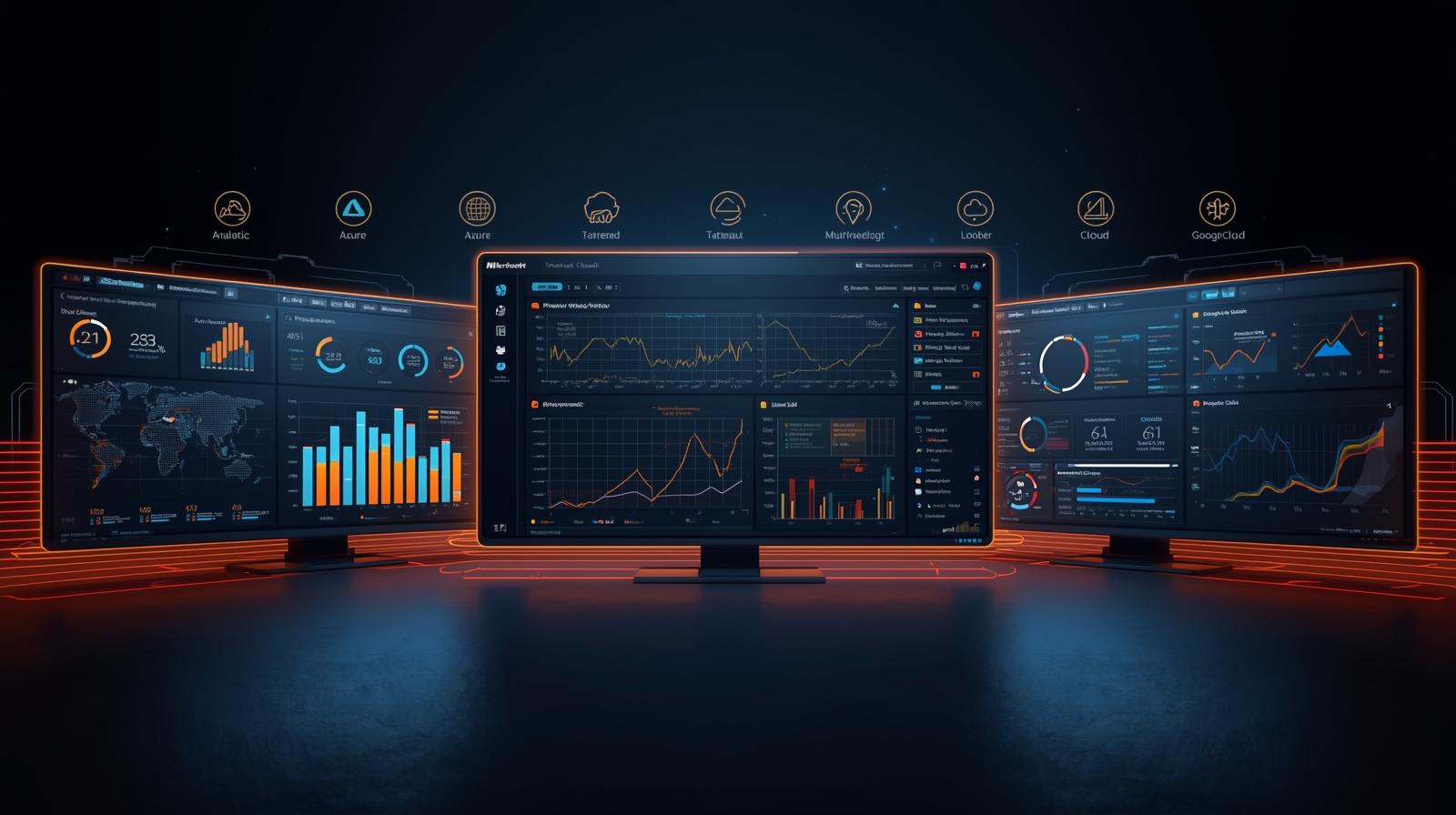Power BI vs. Tableau vs. Looker: Which BI Tool Truly Fits Your Business?
In today’s data-driven world, the BI platform you choose can make or break your analytics strategy. Some tools excel at visual storytelling. Others shine in governance, modeling, or seamless integration with your existing tech stack. And as a CTO or BI leader, you’re not just choosing a platform—you’re choosing the backbone of your organization’s decision-making.
When evaluating looker vs tableau pricing, organizations in highly regulated industries should focus on how to choose between Power BI, Tableau, and Looker for a cloud-first BI strategy in regulated sectors by balancing cost, governance, security, and cloud-native integration.
When comparing business intelligence tools, Looker vs Tableau vs Power BI offers a perspective on their features, while Power BI vs Tableau vs Looker emphasizes performance and integration differences from a different evaluation order. When comparing Tableau vs Power BI vs Looker and Looker vs Power BI vs Tableau, it’s clear that each tool offers unique strengths in data visualization, analytics, and business intelligence integration.
Tableau is often considered the best BI tool for small businesses, according to WhichBI.
Among the hundreds of BI tools available, Power BI, Tableau, and Looker stand out as the industry’s most popular and enterprise-ready solutions. But which one is actually right for your business?
This blog breaks down each tool—its strengths, limitations, ideal use cases, and how they compare—so you can make an informed, strategic decision.
If you’re short on time, here’s the high-level overview:
- Power BI is the go-to choice for Microsoft-first organizations and teams looking for a high-value, cost-effective BI solution.
- Tableau is unmatched when it comes to visual analytics and storytelling.
- Looker is the best choice when governance, semantic modeling, and embedded analytics matter most.
The right fit will come down to your infrastructure, team capability, and long-term data strategy.
🧱 Why Choosing the Right BI Tool Matters
Your BI platform is more than a reporting tool—it’s your company’s lens into its own performance.
A poor fit can lead to:
- Low user adoption
- Inconsistent or unreliable insights
- Integration headaches
- Mounting costs and minimal ROI
To avoid those pitfalls, enterprises need to consider factors like governance needs, cloud infrastructure, team skill sets, data maturity, and analytic complexity.
What is business intelligence? A Beginner’s Guide
What are the top factors to consider when selecting a BI tool for enterprises?
📊 Power BI – Best for Microsoft-Centric Workflows
If your organization is already rooted in the Microsoft ecosystem—Azure, SQL Server, Office 365—Power BI is often the most natural and cost-effective choice.
Pros
- Deep integration with Excel, Teams, and Azure services
- Attractive pricing, especially at scale
- Strong governance and security built into Microsoft’s ecosystem
- Easy for business users to adopt
Cons
- Works best in Microsoft-heavy environments
- Visualizations, while strong, aren’t as advanced as Tableau’s
Best For
- Enterprises already invested in Microsoft tools
- Mid-size companies beginning their BI journey
- Teams wanting quick time-to-value

📈 Tableau – Best for Rich Visual Analytics
Tableau is widely considered the gold standard for data visualization—and for good reason. Its dashboards help teams uncover patterns, trends, and insights that might otherwise stay hidden.
Pros
- Industry-leading, flexible, and interactive visuals
- A massive global community and extensive learning resources
- Works across multiple cloud and on-prem environments
- Ideal for exploration and deep analysis
Cons
- Higher cost, especially as user count increases
- Requires more training for non-technical users
Best For
- Analysts who want powerful visual storytelling
- Enterprises prioritizing deep, interactive dashboards
Is Tableau better for data visualization than Power BI?
🔍 Looker – Best for Embedded Analytics & Governance
Looker takes a fundamentally different approach to BI by using LookML—a semantic modeling layer that ensures consistent, governed definitions of metrics across teams.
Pros
- Exceptional for embedded analytics and white-labeled dashboards
- Centralized modeling ensures single-source-of-truth analytics
- Tight integration with the Google Cloud Platform
- Highly reusable and governed data structures
Cons
- Steeper learning curve, especially for teams without developers
- May be too advanced for organizations needing basic reporting
Best For
- Mature data teams
- Companies needing massive governance across distributed users
- Product companies offering analytics within their applications
🧮 Feature Comparison Table
Here’s a quick side-by-side comparison of the three BI powerhouses:
| Feature | Power BI | Tableau | Looker |
| Visualization | Good | Excellent | Good |
| Price | $ | $$$ | $$$ |
| Ease of Use | High | Medium | Low |
| Cloud Support | Azure | Multi-cloud | GCP |
| Governance | Medium | Medium | High |
| Embedding | Basic | Limited | Excellent |
🎯 Need Help Choosing?
If choosing the right BI tool feels overwhelming, you’re not alone.
Our experts can evaluate your architecture, governance needs, and team capabilities to recommend the best-fit platform.
👉 Explore our BI Consultation Services
🧠 How to Choose Based on Your Business Needs
Start by asking the right questions:
✔ What cloud or infrastructure do you rely on most?
(Microsoft, Google Cloud, AWS)
✔ Who will use the dashboards?
(Analysts vs. Executives)
✔ Do you need embedded analytics or simple dashboards?
✔ What’s your budget for licensing and scaling?
✔ How important is governed, reusable data modeling?
How do I evaluate BI tools based on team size and use cases?
🛠️ Implementation & Support Ecosystem
Adoption success often depends on support, not just features.
- Power BI: Simple onboarding + huge Microsoft community
- Tableau: Strong training ecosystem and certifications
- Looker: Developer-driven community + strong GCP support
Pro Tip: The BI tool you choose is only as effective as the implementation strategy supporting it.
❓ Frequently Asked Questions
Q1: Is Power BI better for small businesses than Tableau?
Yes—especially when cost and Microsoft integration matter.
Q2: Which BI tool is best for embedded analytics?
Looker leads in embedded and governed data modeling.
Q3: Can I migrate from Tableau to Power BI easily?
No. A migration requires rebuilding dashboards, prepping data, and retraining users.
Q4: Which BI tool works best with AWS or Google Cloud?
- Looker → Best for GCP
- Tableau → Works great across clouds
- Power BI is best when using Azure
Q5: How does pricing compare?
Power BI is the most affordable; Tableau and Looker are considered premium enterprise solutions.
Ready to choose the right BI tool and build a scalable analytics foundation?
Our BI specialists can help you evaluate tools, design architecture, and implement dashboards that deliver real business value.






